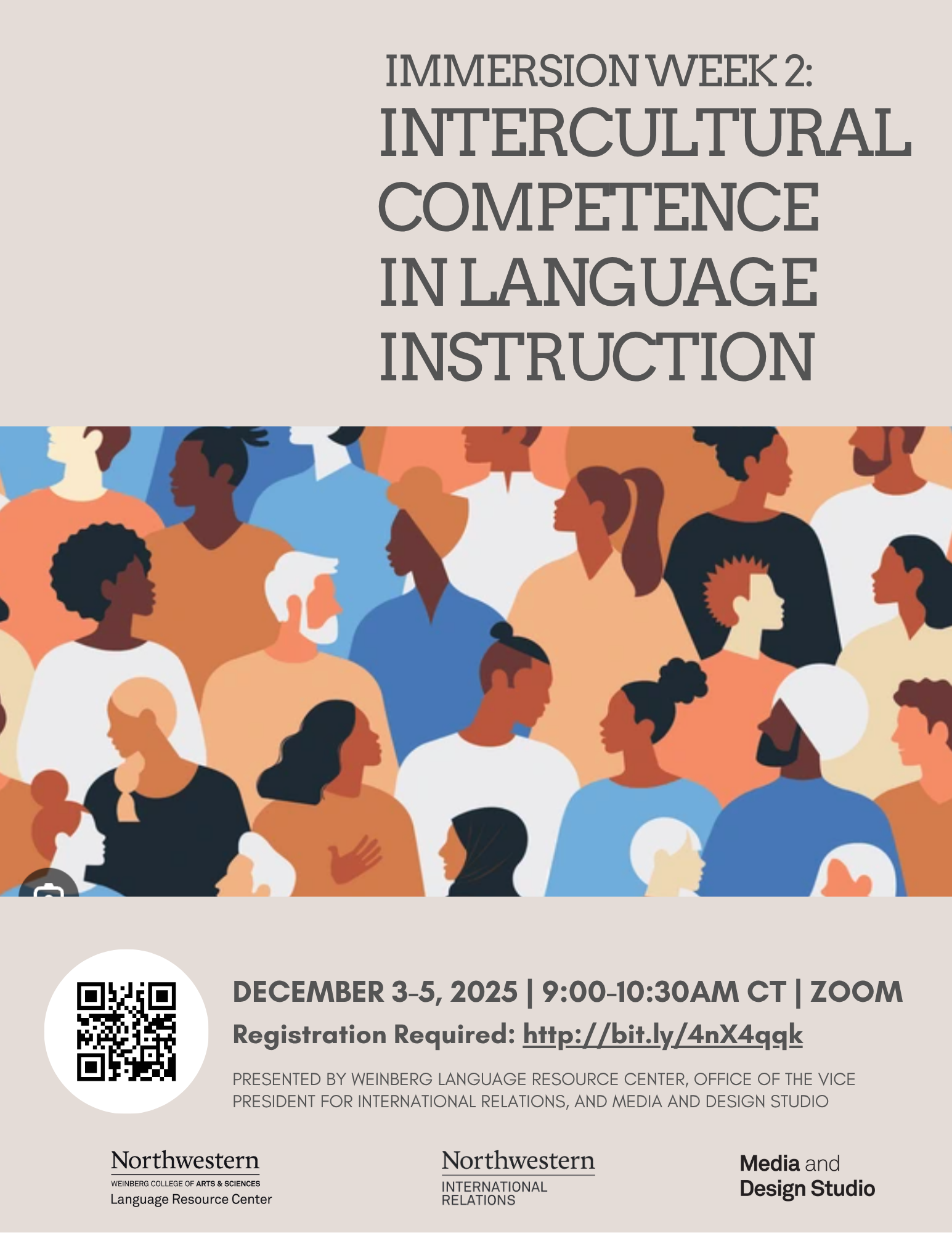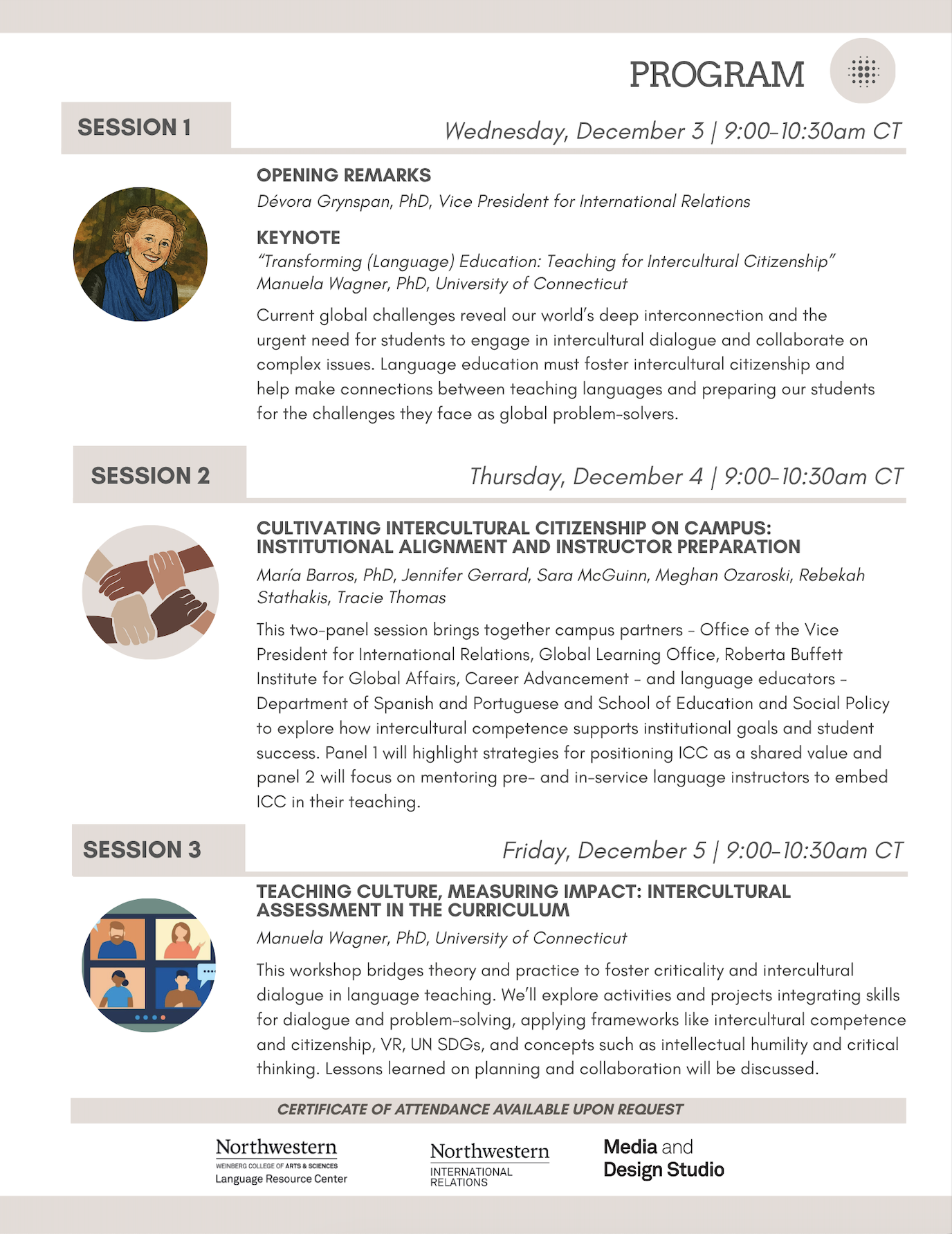2nd Immersion Week: Intercultural Competence in Language Instruction
This three-session professional development initiative focused on intercultural competence and citizenship in language instruction integration, implementation and assessment. The main learning goals were to:
- Deepen understanding of recent scholarship on intercultural learning in language education and use this knowledge to revise or enhance curricular units that foster students’ development of intercultural attitudes, knowledge, and skills.
- Identify ways to connect language instruction with broader institutional goals by incorporating perspectives from campus partners on the value of intercultural competence for student success.
- Gain insight into effective approaches for mentoring and preparing pre-service and in-service language instructors to integrate intercultural competence into their teaching.
- Critically evaluate and adapt existing intercultural competence assessment tools to implement in language curriculum.
📅 December 3-5, 2025 | 9:00 AM - 10:30 AM CT | Virtual
PROGRAM OVERVIEW
SESSION 1 | December 3, 2025: Opening remarks were offered by Dévora Grynspan, Vice President for International Relations at Northwestern University, and keynote address was delivered by Manuela Wagner, Associate Dean for Humanities and Faculty Inclusion and Success, and Professor of Language Education at the University of Connecticut.
Keynote:
"Transforming (Language) Education: Teaching for Intercultural Citizenship”
Global challenges such as the Covid-19 pandemic and the Climate Crisis have underscored how interconnected our world has become. These events highlight a growing need for students to develop the ability to engage in intercultural dialogue across differences and to collaboratively address complex global issues alongside individuals from diverse backgrounds. Recognition of the value of teaching knowledge and skills related to intercultural communication is evident in both national and international initiatives to include intercultural competence in education in meaningful ways (e.g., ACTFL, Council of Europe, PISA assessments 2018).
In her presentation, Dr. Wagner will first reflect on connections between teaching languages and preparing our students for the challenges they face. The conceptualization of teaching languages in a way that prepares students to critically analyze the world around them and decide what actions to take to address a societal issue requires that teaching goes beyond instrumental purposes, e.g., fostering intercultural citizenship (ICIT) (e.g., Byram, 2008) or social justice (SJ) (e.g., Nieto, 2010; Osborn, 2006; Glynn, Wesely, & Wassell, 2014).
Examples and results from a variety of projects will be shared to address questions such as, How can educators guide learners along the journey of becoming “intercultural citizens”? How can we expand learners’ language proficiency while also helping them solve real world problems? How can practitioners implement and sustain this approach to language education? What are some challenges we face in teaching and researching intercultural communication in language education?
SESSION 2 | December 4, 2025: Attendees participated in a panel discussion with representatives from various Northwestern units, highlighting initiatives and best practices that promote intercultural competence for both students and educators.
Panel 1 showcased collaborative strategies for positioning ICC as a shared value across disciplines and student support initiatives.
Panelists:
- Jennifer Gerrard (moderator), Senior Director, Global Engagement and Intercultural Initiatives, Office of the Vice President for International Relations
- Sara McGuinn, Associate Director for Global Engagement Programs, Global Learning Office
- Meghan Ozaroski, Director of Global Collaboration, Roberta Buffett Institute for Global Affairs
- Tracie Thomas, Director of Career Development, Northwestern Career Advancement
Panel 2 focused on effective approaches to mentoring pre-service and in-service language instructors in embedding intercultural competence into their teaching.
Panelists:
- María Barros, Director of Spanish Language Program, Weinberg College of Arts and Sciences
- Rebekah Stathakis, Director of Teacher Preparation Programs, School of Education and Social Policy
SESSION 3 | December 5, 2025: In this workshop, Dr. Wagner bridged theory and practice of teaching (languages) to foster criticality and intercultural dialogue. We analyzed activities, lesson plans, and units that intentionally and systematically integrate the knowledge, skills, and attitudes required to engage in intercultural dialogue and solve real world problems in the target language. Curricular sample projects showed how the theoretical framework of intercultural communicative competence (Byram, 2021, 1997), intercultural citizenship (2008), and interdisciplinary intercultural citizenship (Wagner, Cardetti, and Byram, 2019) as well as Virtual Reality, the U.N. Sustainable Development Goals (U.N., 2015), and concepts such as Intellectual Humility (Whitcomb et al., 2017) and critical thinking (Barnett, 1997) have been applied in language education and beyond.
IW2 Program


ADDITIONAL RESOURCES
